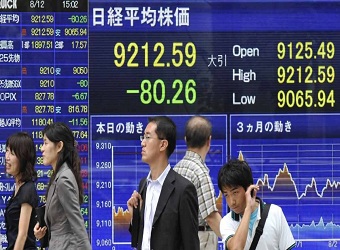Stock markets in Asia ended lower on Friday as U.S.-North Korea geopolitical tensions came to the fore once again, keeping the demand for safe haven assets intact.
South Korea’s benchmark Kospi index dropped 1.69 percent, or 39.76 points, to close at 2,319.71, driven by losses in major tech and retail stocks. Samsung Electronics and SK Hynix ended down 2.79 percent and 4.66 percent respectively, while department store operator Shinsegae tumbled 9.53 percent.
Offshore investors sold 287.1 billion won ($251.5 million) in Kospi-listed stocks in the previous session, the Korean Herald reported, with the information technology sector taking the brunt of the sell off.
In Australia, the S&P/ASX 200 declined 1.18 percent, or 67.833 points, to close at 5,693.100. The index’s move lower was driven by broad-based losses across most sub-indexes although gold stocks climbed. The heavily-weighted financials sub-index was 1.30 percent lower.
Markets in greater China mirrored the slide in global equities. Hong Kong’s Hang Seng Index was down 2.04 percent by 3:05 p.m. HK/SIN. On the mainland, the Shanghai Composite tumbled 1.59 percent, or 51.9447 points, to close at 3,209.8047, and the Shenzhen Composite shed 1.602 percent, or 29.9985 points, to finish the session at 1,842.5981.
Japan markets are closed for the Mountain Day holiday.
After previously warning of “fire and fury” if North Korea persisted in threatening the U.S., President Donald Trump said Thursday his statement “wasn’t tough enough.” While he did not comment on what he meant by that statement, Trump said that North Korea should be “very, very nervous” if it “(did) anything in terms of even thinking about an attack.”
Gold prices eased slightly after rising to their highest levels in more than two months on safe haven demand. Spot gold traded traded as high as $1,288.92 an ounce on Friday, compared to levels around the $1,257 mark earlier this week. The yellow metal traded at $1,284.64 an ounce at 2:48 p.m. HK/SIN.
“Traders should closely watch global equities, with further falls and risk aversion likely pumping more safe haven flows into precious metals,” said OANDA senior market analyst Jeffrey Halley.
North Korean headlines were expected to be the main driver of gold prices in the days ahead, he added.
Demand for the Japanese yen remained supported, with the dollar extending losses made in the Thursday session. The Japanese currency last traded at 109.21 yen to the dollar, off a high of 108.88 yen seen earlier in the session but still stronger than levels around the 110 handle seen earlier this week.
Yields of the benchmark 10-year U.S. Treasury fell to a one-and-a-half month low of around 2.20 percent in the Thursday session. Ten-year yields were around 2.25 percent earlier in the week.
In corporate news, Noble Group announced a net loss of $1.9 billion in the first half of 2017. Noble has been forced to shuffle management, sell down assets and slash costs to boost liquidity. Despite the losses, Noble shares were up 22.86 percent.
Also of note, Japan’s SoftBank Group has invested almost $2.5 billion in India-based e-commerce player Flipkart. The funding will come from SoftBank’s Vision Fund in the form of share purchases, Reuters reported.
Among market movers during the session, Hong Kong-listed Tencent stock was down 4.10 percent following news that Chinese regulators were investigating the company for cyber-security violations. Other Chinese internet companies involved in the probe were New York-listed Baidu and Sina.
Also in Hong Kong, shares of rail operator MTR Corporation fell 3.56 percent after the company announced first-half net profit rose 46.1 percent from the year before.
Still, Nomura analysts Benjamin Lo and Sylvia Chan downgraded MTR stock to “neutral” from “buy,” citing near term headwinds. Among the cash-flow headwinds identified were lower-than-expected patronage growth at MTR’s two new lines and an upward revision in the company’s capital expenditure budget.
Meanwhile, the dollar index, which tracks the dollar against a basket of six major currencies, slipped on the back of weaker-than-expected U.S. producer prices. The index stood at 93.468 at 2:45 p.m. HK/SIN, below levels around the 93.4 handle seen in the previous session. Ahead, the release of U.S. July CPI due during the U.S. trading day is expected to influence the direction of the dollar.
“The drop in PPI signals potential weakness in CPI, but even if consumer prices tick higher like economist[s] anticipate, it won’t be enough because the Federal Reserve doesn’t feel good about inflation,” BK Asset Management Managing Director Kathy Lien said in a note.
Heightened geopolitical tensions between the U.S. and North Korea also meant that the dollar/yen pair would have a difficult time responding to positive data, Lien added.
In other currency market news, the Philippine peso fell to an 11-year low against the dollar, according to Reuters. The currency traded at 50.970 pesos to the dollar at 2:41 p.m. HK/SIN after falling to as little as 51.073 pesos earlier in the session.
Oil prices extended losses after slumping more than 1.5 percent overnight on oversupply concerns, Reuters reported. Brent crude declined 0.58 percent to trade at $51.60 a barrel and U.S. crude erased 0.64 percent to trade at $48.28.
In economic news, second-quarter Singapore GDP growth was revised upwards to 2.2 percent compared to the previous quarter, above an earlier estimate of 0.4 percent growth. The figure reflected a 2.9 percent rise compared to one year ago.
Markets stateside tumbled on the back of the U.S.-North Korea geopolitical tensions, with the Dow Jones industrial average falling 0.93 percent to close at 21,844.01. The Nasdaq dropped 2.13 percent, or 135.46 points, to finish at 6,216.87.
Source: CNBC


